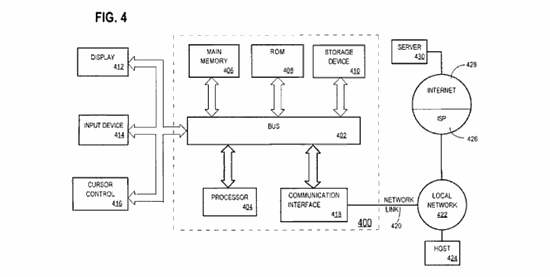I originally wrote this column over at Wired back on March 13 about my experience with patents at Yahoo, but forgot to republish it here on Waxy.org in my permanent archive.
This article received a bigger response, hands-down, than anything I’ve written for Wired so far, resting at the top of Techmeme for a full day, with widespread coverage from The Telegraph, The Verge, Fox News, and Business Insider. (That’s a good signal you’ve written something notable: when competing tech magazines start linking to your work.)
Almost two weeks later, I’m still angry but happy that the column ignited such a powerful discussion about the patent issue. I’m especially pleased that “weaponizing patents” is entering the lexicon; articles like these use the phrase without mentioning me at all. Awesome.
For two other perspectives on this issue, I enjoyed Mark Cuban’s linkbait take and Fred Wilson’s short, furious rant.
Anyway, if you hadn’t seen it, I hope you enjoy it.
While most of the tech world was partying at South by Southwest in Austin yesterday, Yahoo announced it was filing a lawsuit against Facebook for allegedly infringing on 10 patents from their 1,000+ patent warehouse.

I’m no fan of Facebook, but this is a deplorable move. It’s nothing less than extortion, expertly timed during the SEC-mandated quiet period before Facebook’s IPO. It’s an attack on invention and the hacker ethic.
In the interest of full disclosure, I have a small supporting role in this story. None of the patents I co-invented are cited in the Yahoo complaint, but a handful of applications I worked on with Yahoo were granted patents, weaponized now to use against people like me.
Here’s how the process worked, in my case:
In 2005, Yahoo acquired Upcoming.org, the collaborative events calendar I’d launched two years before.
Back then, the Web 1.0 behemoth seemed on the verge of turning things around. A series of smart moves — high-profile hires, the Oddpost and Flickr acquisitions, the launch of the Yahoo! Developer Network, and their Research Lab — was breathing new life into things. Two months after we were acquired, Del.icio.us and Webjay joined us in the Yahoo fold.
After we moved in, we were asked to file patents for anything and everything we’d invented while working on Upcoming.org. Every Yahoo employee was encouraged to participate in their “Patent Incentive Program,” with sizable bonuses issued to everyone who took the time to apply.
Now, I’ve always hated the idea of software patents. But Yahoo assured us that their patent portfolio was a precautionary measure, to defend against patent trolls and others who might try to attack Yahoo with their own holdings. It was a cold war, stockpiling patents instead of nuclear arms, and every company in the valley had a bunker full of them.
Against my better judgement, I sat in a conference room with my co-founders and a couple of patent attorneys and told them what we’d created. They took notes and created nonsensical documents that I still can’t make sense of. In all, I helped Yahoo file eight patent applications.

Years after I left I discovered to my dismay that four of them were granted by the U.S. Patent and Trade Office.
I thought I was giving them a shield, but turns out I gave them a missile with my name permanently engraved on it.
I was naive. Even if the original intention was truly defensive, a patent portfolio can easily change hands, and a company can even more easily change its mind. Since I left in 2007, Yahoo has had three CEOs and a board overhaul.
The scary part is that even the most innocuous patent can be used to crush another’s creativity. One of the patents I co-invented is so abstract, it could not only cover Facebook’s News Feed, but virtually any activity feed. It puts into very sharp focus the trouble with software patents: Purposefully vague wording invites broad interpretation.
In their complaint, Yahoo alleges that Facebook’s News Feed violates “Dynamic page generator,” a patent filed in 1997 by their former CTO related to the launch of My Yahoo, one of the first personalized websites. Every web application, from Twitter to Pinterest, could be said to violate this patent. This is chaos.
Software patents should be abolished, plain and simple. Software is already covered by copyright, making patent protection unnecessary.
Ask any programmer — developing software is as creative and unique as writing poetry.
Yahoo’s lawsuit against Facebook is an insult to the talented engineers who filed patents with the understanding they wouldn’t be used for evil. Betraying that trust won’t be forgotten, but I doubt it matters anymore. Nobody I know wants to work for a company like that.
I’m embarrassed by the patents I filed, but I’ve learned from my mistake. I’ll never file a software patent again, and I urge you to do the same.

For years, Yahoo was mostly harmless. Management foibles and executive shuffles only hurt shareholders and employee morale. But in the last few years, the company’s incompetence has begun to hurt the rest of us. First, with the wholesale destruction of internet history, and now by attacking younger, smarter companies.
Yahoo tried and failed, over and over again, to build a social network that people would love and use. Unable to innovate, Yahoo is falling back to the last resort of a desperate, dying company: litigation as a business model.
That it’s Yahoo makes it even sadder. The complaint isn’t really wrong when it asserts that: “For much of the technology upon which Facebook is based, Yahoo! got there first.”
But being first with something generic that would have been invented by someone (like the wheel) — as opposed to something few could have imagined (like the Segway) — is a big difference.
Ask any start-up CEO — execution is everything.
As the fictionalized Mark Zuckerberg says in The Social Network, “If you guys were the inventors of Facebook, you’d have invented Facebook.”

once yahoo lays off more people, facebook should be able to acquire yahoo as a talent acquisition.
So what your saying is, if anyone creates their own social network, we can’t have our own activity feed without infringing on fb’s patent?
You’d be violating Yahoo’s patent, but odds are Facebook probably has a patent you’d violate too. The software patent situation is ridiculous, effectively making it impossible to make ANYTHING without infringing dozens and dozens of patents.
Should you be not very active looking for consideration, all I pick up is a lot of moaning about one thing you can correct.